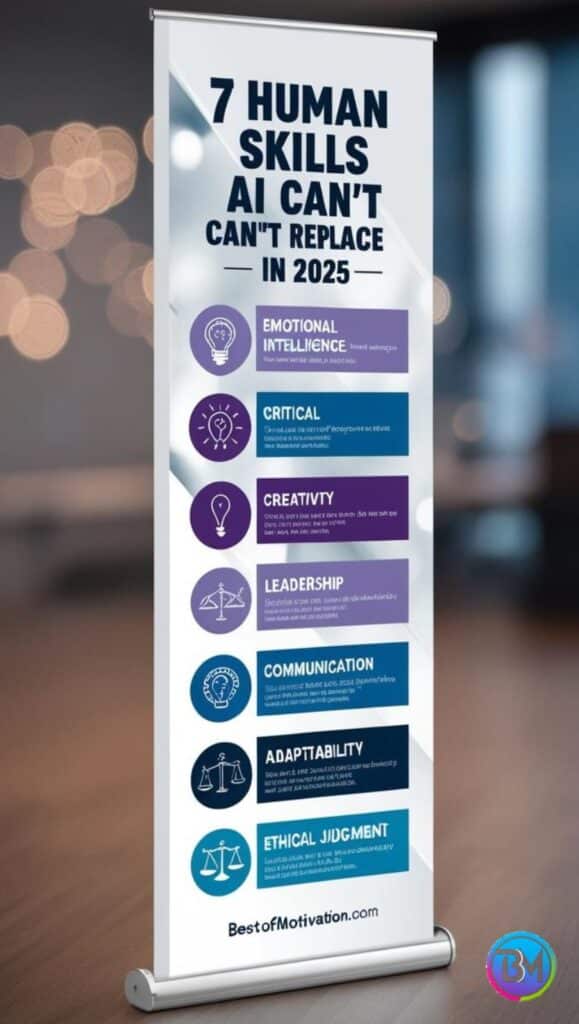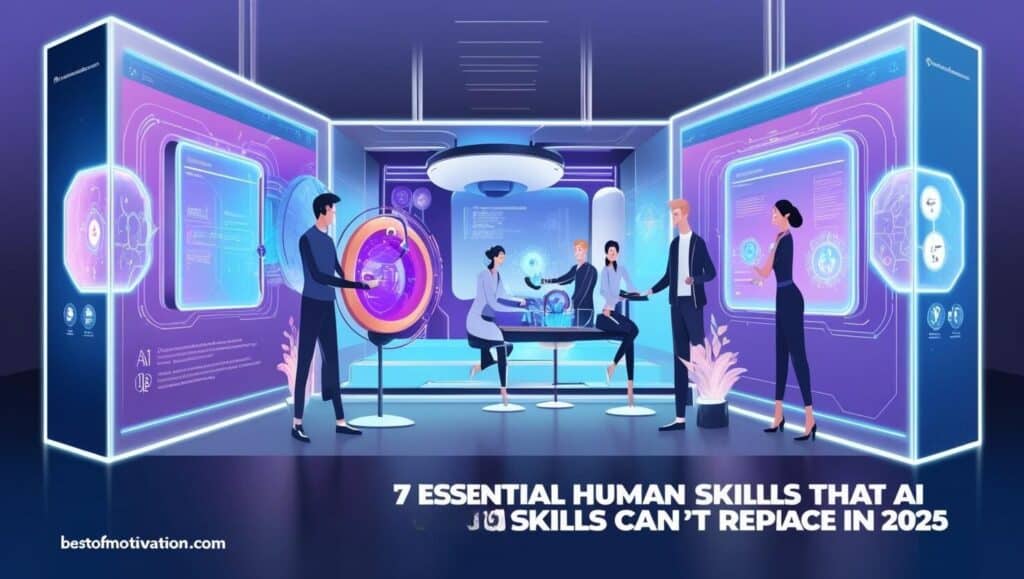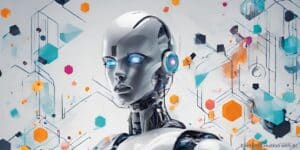In an era where artificial intelligence (AI) is revolutionizing industries, the fear of being replaced by machines looms large. But here’s the silver lining: no matter how advanced AI becomes, there are uniquely human skills it can’t replicate. Mastering these skills ensures you’re not just surviving but thriving in a tech-driven world. Let’s dive into the seven essential human skills that AI can’t replace in 2025 and how you can leverage them to future-proof your career.
Why These Skills Matter in the Age of AI
AI excels at crunching data, automating repetitive tasks, and performing highly specialized operations. However, it lacks emotional intelligence, creativity, and the nuanced understanding of human behavior that drives innovation, connection, and leadership. These irreplaceable skills are your key to staying ahead of the curve.
“The future belongs to those who master what AI can’t: the art of being human.”
Whether you’re a young professional, seasoned leader, or someone transitioning careers, focusing on these skills will empower you to remain indispensable.
📊 Stats That Prove Why Human Skills Rule! 🚀
“90% of top performers have high emotional intelligence (EQ).” Source: TalentSmart 🔗
“By 2030, demand for soft skills will grow by 26%.” Source: Deloitte Insights 🔗
“Creativity ranks among the top 3 skills employers want globally.” Source: World Economic Forum 🔗
✨ Master these skills and future-proof your career in 2025!
Key Takeaways
🎯 Discover seven human skills that will thrive in an AI-driven world.
🧠 Learn actionable tips to develop these skills in your daily life.
🌍 Explore real-world examples of industries benefiting from human-centered expertise.
💡 Unlock strategies to future-proof your career against automation.
The 7 Human Skills That AI Can’t Replace
1. Emotional Intelligence (EQ)
AI can analyze data patterns, but it struggles with the complexity of human emotions. Emotional intelligence involves understanding your own emotions, empathizing with others, and managing relationships effectively.
Why It’s Essential:
- EQ drives collaboration, conflict resolution, and leadership.
- Empathy builds trust, a critical element in team dynamics and customer relationships.
How to Strengthen EQ:
- Practice mindfulness: Stay present and reflect on your emotional triggers.
- Seek feedback: Understand how your actions impact others.
- Engage in active listening: Focus on understanding rather than replying.
Example: A customer service representative with high EQ can turn a frustrated customer into a loyal advocate—something AI chatbots often struggle to achieve.
2. Critical Thinking and Problem-Solving
AI can provide answers, but it doesn’t ask the right questions. Critical thinking involves analyzing complex information, questioning assumptions, and making well-informed decisions.
Why It’s Essential:
- Problem-solving requires adaptability and creative thought that AI lacks.
- Professionals who can navigate ambiguity are invaluable in volatile markets.
How to Strengthen Critical Thinking:
- Challenge your assumptions: Ask “why” five times to uncover root causes.
- Engage in brainstorming sessions: Generate innovative solutions with diverse perspectives.
- Practice scenario planning: Consider multiple outcomes and prepare for each.
Example: Engineers troubleshooting system failures often rely on intuition and out-of-the-box thinking, making them irreplaceable in tech industries.
3. Creativity and Innovation
AI can process existing ideas, but it can’t originate groundbreaking concepts. Creativity is about connecting disparate ideas to create something entirely new.
Why It’s Essential:
- Innovation drives competitive advantage in industries like marketing, design, and R&D.
- Human creativity leads to cultural and technological breakthroughs.
How to Cultivate Creativity:
- Engage in diverse experiences: Travel, read widely, and explore new hobbies.
- Use brainstorming techniques: Mind mapping, journaling, and sketching can spark fresh ideas.
- Collaborate with others: Diverse teams foster unique perspectives.
Example: Creative directors who craft compelling ad campaigns blend emotional resonance with aesthetic appeal—something algorithms can’t replicate.
4. Leadership and Strategic Vision
AI can analyze trends, but it lacks the ability to inspire teams and align them toward a shared goal. Leadership is about motivating others and steering them through uncertainty.
Why It’s Essential:
- Leaders build trust, morale, and cohesion in teams.
- Strategic vision requires balancing short-term results with long-term growth.
How to Develop Leadership Skills:
- Learn to delegate effectively: Empower your team to take ownership.
- Communicate with clarity: Share your vision and expectations.
- Invest in mentorship: Learn from seasoned leaders and guide others.
Example: Startups thrive when leaders inspire passion and align their teams to pursue a common mission, adapting to challenges with resilience.
5. Interpersonal Communication
AI can process language, but it can’t replicate authentic human connection. Interpersonal communication involves verbal and non-verbal cues that foster understanding and collaboration.
Why It’s Essential:
- Effective communication builds strong relationships in the workplace.
- Clarity and empathy prevent misunderstandings and conflict.
How to Improve Communication Skills:
- Focus on body language: Make eye contact, nod affirmatively, and maintain an open posture.
- Practice concise storytelling: Clearly articulate ideas while keeping them engaging.
- Adapt to your audience: Tailor your message to resonate with different stakeholders.
Example: Negotiators rely on persuasive communication and reading non-verbal cues to close deals—an irreplaceable skillset in business.
6. Adaptability and Resilience
AI operates within predefined parameters, but humans thrive in uncertainty. Adaptability involves embracing change, while resilience is about recovering from setbacks.
Why It’s Essential:
- Rapid technological advancements require agility in learning and application.
- Resilient professionals navigate disruptions and maintain productivity.
How to Build Adaptability:
- Cultivate a growth mindset: View challenges as opportunities for growth.
- Stay curious: Embrace lifelong learning to stay relevant in your field.
- Practice self-care: Resilience is fueled by physical and mental well-being.
Example: During the COVID-19 pandemic, educators who adapted to virtual teaching methods demonstrated the value of human flexibility.
7. Ethical Judgment and Moral Reasoning
AI lacks the capacity to make ethical decisions based on cultural, emotional, and societal contexts. Humans are essential for navigating moral dilemmas.
Why It’s Essential:
- Ethical reasoning ensures that technology serves humanity responsibly.
- It’s crucial for professions like law, medicine, and policymaking.
How to Strengthen Ethical Judgment:
- Engage in ethical discussions: Debate real-world case studies.
- Learn from diverse cultures: Exposure to global perspectives fosters nuanced thinking.
- Prioritize integrity: Act consistently with your core values.
Example: Data privacy officers play a vital role in ensuring AI applications align with ethical standards, safeguarding user rights.

Industries Valuing These Human Skills in 2025
Here are examples of sectors where these skills remain critical despite AI advancements:
- Healthcare: Empathy and ethical judgment are essential for patient care.
- Education: Adaptable and inspiring teachers foster student growth.
- Creative Arts: Innovation and storytelling remain uniquely human domains.
- Leadership Roles: Visionary leaders drive organizational success.
- Customer Service: Emotional intelligence enhances customer experiences.
Conclusion: Thrive in the Age of AI
The rapid growth of AI isn’t a threat—it’s an opportunity to focus on what makes us uniquely human. By mastering emotional intelligence, creativity, leadership, and the other essential skills outlined here, you’ll remain indispensable in any industry.
“Adapt, grow, and lead—because the future needs your human touch.”
Call to Action
💡 Ready to level up your career? Subscribe to our newsletter for more actionable insights, tips, and resources to future-proof your skills!
FAQs
Q: What are the most important skills to learn for the future of work?
A: Emotional intelligence, creativity, and critical thinking top the list.
Q: How can I improve my adaptability in the workplace?
A: Embrace lifelong learning, stay curious, and develop a growth mindset.
Q: Are creative jobs safe from AI automation?
A: Yes, jobs requiring originality and artistic vision are highly resilient to AI disruption.
This guide not only equips you with the tools to navigate a tech-driven landscape but ensures your career thrives in a world where the human touch matters most.












